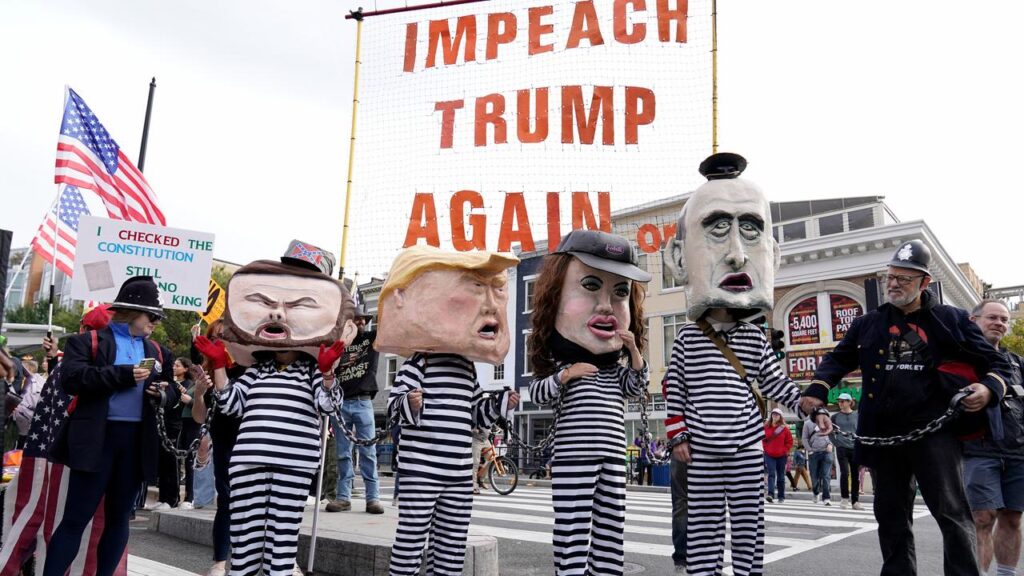Anti-Trump ‘No Kings’ protests bring street party vibe
MIKE PESOLI, MATT BROWN and GARY FIELDS |

Large crowds of protesters marched and rallied in cities across the US for “No Kings” demonstrations, decrying what participants see as the government’s swift drift into authoritarianism under President Donald Trump.
Organisers said nearly seven million people took part in peaceful demonstrations in some 2700 cities and municipalities on Saturday – hundreds more locations than in a previous protest in June.
People carrying signs with slogans such as “Nothing is more patriotic than protesting” or “Resist Fascism” packed into New York City’s Times Square and rallied by the thousands in parks in Boston, Atlanta and Chicago.

Demonstrators marched through Washington and downtown Los Angeles and picketed outside capitols in several Republican-led states, a courthouse in Billings, Montana, and at hundreds of smaller public spaces.
The Republican Party disparaged the demonstrations as “Hate America” rallies, but in many places the events looked more like a street party.
There were marching bands, huge banners with the US Constitution’s “We The People” preamble that people could sign, and demonstrators wearing inflatable costumes.
It was the third mass mobilisation since Trump’s return to the White House and came against the backdrop of a government shutdown that not only has closed federal programs and services but is testing the core balance of power, as an aggressive executive confronts Congress and the courts in ways that protest organisers warn are a slide toward authoritarianism.
In Washington, Iraq War Marine veteran Shawn Howard said he had never participated in a protest before but was motivated to show up because of what he sees as the Trump administration’s “disregard for the law”.
He said immigration detentions without due process and deployments of troops in US cities are “un-American” and alarming signs of eroding democracy.

Trump, meanwhile, was spending the weekend at his Mar-a-Lago home in Florida.
“They say they’re referring to me as a king. I’m not a king,” the president said in a Fox News interview that aired early o Friday, before he departed for a $US1 million ($A1.5 million)-per-plate MAGA Inc fundraiser at his club.
In San Francisco hundreds of people spelled out “No King!” and other phrases with their bodies on Ocean Beach. Hayley Wingard, who was dressed as the Statue of Liberty, said she too had never been to a protest before. Only recently she began to view Trump as a “dictator”.
About 3500 people gathered in Salt Lake City outside the Utah State Capitol to share messages of hope and healing after a protester was fatally shot during the city’s first “No Kings” march in June.

And more than 1500 people gathered in Birmingham, Alabama, evoking and the city’s history of protests and the critical role it played in the Civil Rights Movement two generations ago.
“It just feels like we’re living in an America that I don’t recognise,” said Jessica Yother, a mother of four. She and other protesters said they felt camaraderie by gathering in a state where Trump won nearly 65 per cent of the vote last November.
While protests earlier this year – against Elon Musk’s cuts and Trump’s military parade – drew crowds, organisers say this one is uniting the opposition.
The national march against Trump and Musk this spring had 1300 registered locations, while the first “No Kings” day in June registered 2100.
“We’re here because we love America,” Democrat Senator Bernie Sanders said, addressing the crowd from a stage in Washington. He said the American experiment is “in danger” under Trump but insisted, “We the people will rule.”
Republicans sought to portray protesters as far outside the mainstream and a prime reason for the government shutdown, now in its 18th day.

From the White House to Capitol Hill, GOP leaders called them “communists” and “Marxists”.
“I encourage you to watch – we call it the Hate America rally – that will happen Saturday,” said House Speaker Mike Johnson of Louisiana.
Democrats have refused to vote on legislation that would reopen the government as they demand funding for health care. Republicans say they are willing to discuss the issue later, only after the government reopens.
The situation is a potential turnaround from just six months ago, when Democrats and their allies were divided and despondent.
“What we are seeing from the Democrats is some spine,” said Ezra Levin, a co-founder of Indivisible, a key organising group.
“The worst thing the Democrats could do right now is surrender.”
with dpa
AP